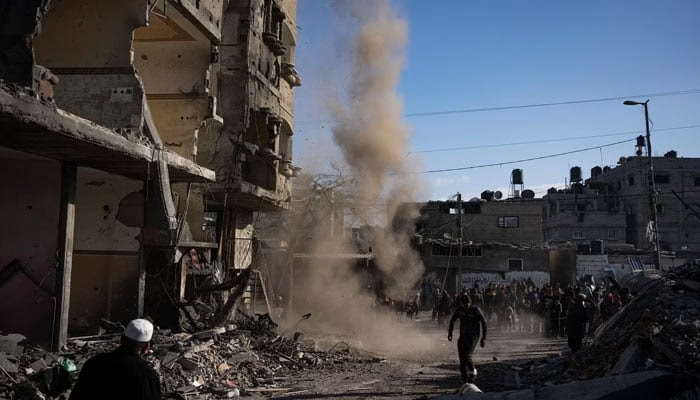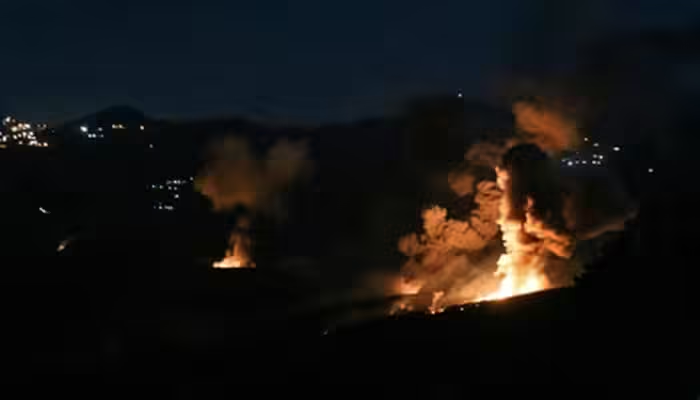The humanitarian crisis in Gaza continues to deepen as Israeli forces intensified their bombardment, killing at least 40 more Palestinians in the latest wave of attacks. According to Arab media, Gaza is on the brink of a full-scale famine, with critical supplies blocked by the ongoing Israeli siege.
International aid organizations warn that without immediate intervention, the humanitarian situation could spiral into one of the worst famines in modern history.
Humanitarian Agencies Sound Alarm on Gaza Famine
Aid agencies operating in Gaza have issued urgent warnings about the deteriorating situation. With roads destroyed, supplies blocked, and medical services overwhelmed, hundreds of thousands of Palestinians are facing acute food shortages.
One humanitarian agency stated, Gaza is dangerously close to a complete famine. Children are already dying of hunger and dehydration. Immediate, unrestricted access for humanitarian aid is crucial.
The blockade imposed by Israeli forces has prevented vital food, water, and medical supplies from reaching the millions of civilians trapped in the besieged territory.
Hamas to Present Ceasefire and Reconstruction Proposals
Amidst the escalating violence, the Palestinian resistance movement Hamas announced plans to present its stance during the upcoming talks in Cairo. The group stated it would offer detailed proposals on a ceasefire, prisoner exchanges, and the reconstruction of Gaza’s devastated infrastructure.
Sources close to the negotiations reveal that Hamas will demand an immediate halt to Israeli military operations, full withdrawal from Gaza, and an international commitment to rebuilding destroyed homes, hospitals, and schools.
The talks in Cairo are seen as a critical opportunity to bring an end to months of bloodshed, although hopes remain cautious given previous failures to secure lasting peace.
Israeli Military Struggles with Manpower Shortages
In a rare admission, a former Israeli Prime Minister acknowledged that the Israeli military is currently facing serious manpower shortages. The extended conflict, combined with mounting casualties and reservist fatigue, has significantly weakened the operational capabilities of the Israeli Defense Forces (IDF).
Military analysts suggest that Israel’s strategy of prolonged bombardment and ground incursions into Gaza is increasingly unsustainable without sufficient troop reinforcements.
Protests Erupt in Tel Aviv Against Netanyahu’s Government
Meanwhile, domestic unrest within Israel is growing. Thousands of protesters flooded the streets of Tel Aviv, demanding the immediate release of hostages held in Gaza and an urgent ceasefire to end the conflict.
Chanting slogans against Israeli Prime Minister Benjamin Netanyahu, demonstrators accused the government of mishandling the situation and putting political interests above human lives. Some protest banners read, Bring Them Home Now and Stop the War, Save Lives.
Several families of hostages spoke at the rally, sharing emotional appeals for the government to prioritize negotiations over continued military aggression.
Growing International Pressure
The ongoing violence and humanitarian catastrophe in Gaza have triggered renewed international outrage. Human rights organizations, world leaders, and the United Nations have repeatedly called for an immediate ceasefire and unrestricted access for humanitarian aid.
Pressure is also mounting on the United States and European nations to reconsider their military support for Israel in light of the alleged war crimes and massive civilian casualties being reported.
UN officials emphasized that the current situation could constitute violations of international humanitarian law, particularly given the scale of suffering inflicted on Gaza’s civilian population.
What Lies Ahead?
As the conflict drags on with no immediate resolution in sight, the future for Gaza remains uncertain. Talks in Cairo offer a glimmer of hope, but much depends on whether both sides are willing to make significant concessions.
For the millions trapped in Gaza, each day brings fresh horrors: more bombings, more funerals, and more hunger. Aid agencies stress that unless there is swift action to lift the siege and provide emergency relief, an entirely preventable famine could soon claim thousands more lives.
The world watches anxiously, hoping for a breakthrough that will end the bloodshed and allow Gaza’s shattered communities a chance to heal and rebuild.



